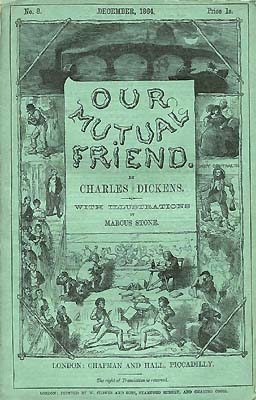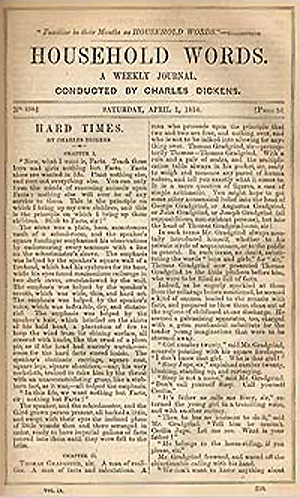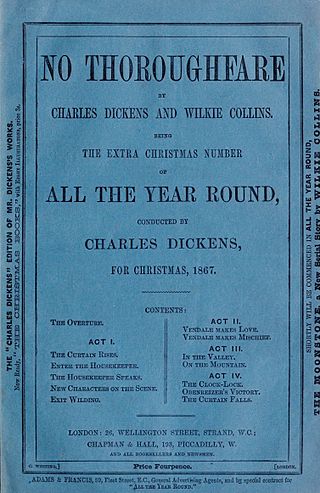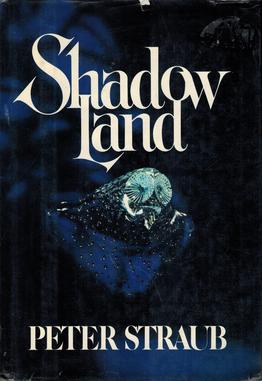
Charles John Huffam Dickens was an English novelist and social critic who created some of the world's best-known fictional characters, and is regarded by many as the greatest novelist of the Victorian era. His works enjoyed unprecedented popularity during his lifetime and, by the 20th century, critics and scholars had recognised him as a literary genius. His novels and short stories are widely read today.

A Christmas Carol. In Prose. Being a Ghost Story of Christmas, commonly known as A Christmas Carol, is a novella by Charles Dickens, first published in London by Chapman & Hall in 1843 and illustrated by John Leech. A Christmas Carol recounts the story of Ebenezer Scrooge, an elderly miser who is visited by the ghost of his former business partner Jacob Marley and the spirits of Christmas Past, Present and Yet to Come. After their visits, Scrooge is transformed into a kinder, gentler man.

William Wilkie Collins was an English novelist and playwright known especially for The Woman in White (1859), a mystery novel and early "sensation novel", and for The Moonstone (1868), which established many of the ground rules of the modern detective novel and is also perhaps the earliest clear example of the police procedural genre.

Oliver Twist; or, The Parish Boy's Progress, is the second novel by English author Charles Dickens. It was originally published as a serial from 1837 to 1839 and as a three-volume book in 1838. The story follows the titular orphan, who, after being raised in a workhouse, escapes to London, where he meets a gang of juvenile pickpockets led by the elderly criminal Fagin, discovers the secrets of his parentage, and reconnects with his remaining family.

Jack Dawkins, better known as the Artful Dodger, is a character in Charles Dickens's 1838 novel Oliver Twist. The Dodger is a pickpocket and his nickname refers to his skill and cunning in that occupation. In the novel, he is the leader of the gang of child criminals on the streets of London trained and overseen by the elderly Fagin. The term has become an idiom describing a person who engages in skilful deception.

Eleanor Farjeon was an English author of children's stories and plays, poetry, biography, history and satire.

Our Mutual Friend, written in 1864–1865, is the last novel completed by Charles Dickens and is one of his most sophisticated works, combining savage satire with social analysis. It centres on, in the words of critic J. Hillis Miller, quoting the book's character Bella Wilfer, "money, money, money, and what money can make of life".

All the Year Round was a Victorian periodical, being a British weekly literary magazine founded and owned by Charles Dickens, published between 1859 and 1895 throughout the United Kingdom. Edited by Dickens, it was the direct successor to his previous publication Household Words, abandoned due to differences with his former publisher.

Hard Times: For These Times is the tenth novel by Charles Dickens, first published in 1854. The book surveys English society and satirises the social and economic conditions of the era.
Edward Richard Buxton Shanks was an English writer, known as a war poet of World War I, then as an academic and journalist, and literary critic and biographer. He also wrote some science fiction.

"It was a dark and stormy night" is an often-mocked and parodied phrase considered to represent "the archetypal example of a florid, melodramatic style of fiction writing", also known as purple prose.

Fagin is a fictional character and the secondary antagonist in Charles Dickens's 1838 novel Oliver Twist. In the preface to the novel, he is described as a "receiver of stolen goods". He is the leader of a group of children whom he teaches to make their livings by pickpocketing and other criminal activities, in exchange for shelter. A distinguishing trait is his constant and insincere use of the phrase "my dear" when addressing others. At the time of the novel, he is said by another character, Monks, to have already made criminals out of "scores" of children. Nancy, who is the lover of Bill Sikes, is confirmed to be Fagin's former pupil.

No Thoroughfare is a stage play and novel by Charles Dickens and Wilkie Collins, both released in December 1867.
The bibliography of Charles Dickens (1812–1870) includes more than a dozen major novels, many short stories, several plays, several non-fiction books, and individual essays and articles. Dickens's novels were serialized initially in weekly or monthly magazines, then reprinted in standard book formats.

James Lucas was a celebrated English Victorian eccentric and hermit who gained international renown by his strange way of life. He was known as the Hermit of Hertfordshire and Mad Lucas.

Shadowland is a horror/fantasy novel by American writer Peter Straub, first published in 1980 by Coward, McCann & Geoghegan. It is a horror novel that has strong elements of fantasy and magic. The book chronicles the tale of two teenage boys and their adventure in the mysterious and dangerous Shadowland where reality and illusions are intertwined. It was the first book Straub wrote following his highly successful Ghost Story.
John Berwick Harwood was an English writer, best known for his ghost stories. He wrote many stories and articles, some of them about his experiences in China. He contributed short stories to Once A Week, Cassell's Family Magazine, Blackwood's Magazine and the Cornhill Magazine. He wrote about twenty novels and several Christmas horror tales.

"Levy-Dew", also known as "A New Year Carol" and "Residue", is a British folk song of Welsh origin traditionally sung in New Year celebrations. It is associated with a New Year's Day custom involving sprinkling people with water newly drawn from a well. The song was set to music by Benjamin Britten in 1934.

No One Must Know is a 1962 children's novel by the English writer Barbara Sleigh. The story concerns a small group of children living in English town, sandwiched between a railway and a warehouse, in a row of rented, white-painted terraced houses, where the landlord will allow no pets.















